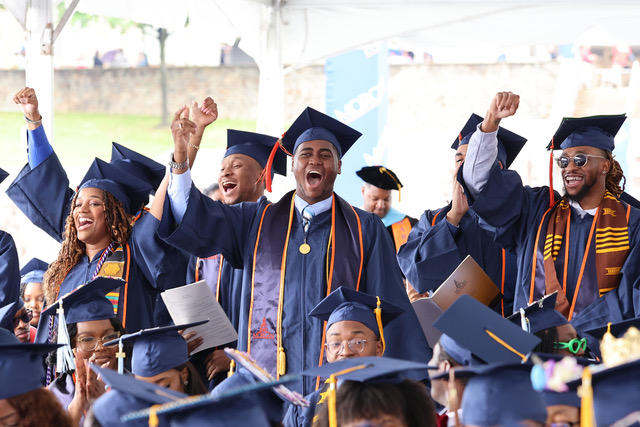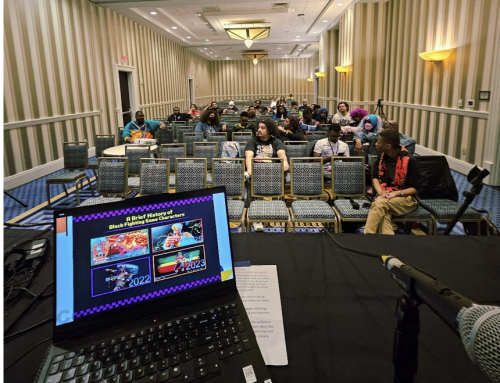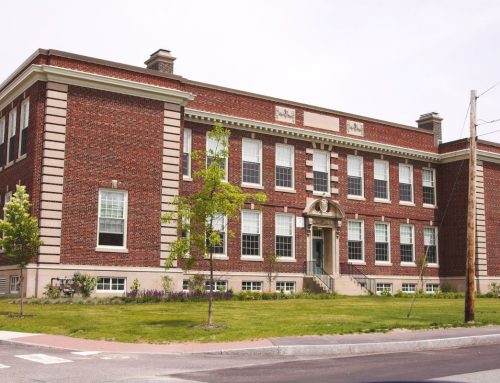Graduation days – May 15th and 17th – are exciting at Morgan State University (MSU). This spring, the keynote commencement speaker will be Thasunda Brown Duckett, president and CEO of the Teachers Insurance and Annuity Association of America (TIAA). As one of the few Black women to lead a Fortune 500 company, Duckett champions economic empowerment and wealth equity. As one of only two current Black women CEOs in America, Ms. Duckett knows the importance of resilience. As she has stated many times, being successful requires “grit, determination, and perseverance.”
At the National Center for the Elimination of Educational Disparities (NCEED), our work strives to help students succeed, often “against all odds.” One of our core pillars, the Family, Student, and Teacher Academic Resilience (fSTAR) Pillar, recognizes the power and importance of families, institutions, and the history of local communities. This work has played a pivotal role in fostering educational opportunities and literacy. Our events, such as “Young Scholars Day” and “Battle of the Books,” have brought over a thousand students from across Baltimore and neighboring regions to the MSU campus, exposing them to higher education environments and encouraging a love for reading and learning.
NCEED’s partnerships with local schools and organizations, such as the Greater Baltimore Urban League and Baltimore City Public Schools, have supported students and early-career teachers. At the state level, NCEED’s collaborations with Harford and Baltimore County Public Schools through the “Grow Your Own” program underscore its commitment to developing a diverse and skilled educational workforce. These initiatives, along with the Center’s involvement in the statewide Assessment and Accountability Task Force, illustrate our dedication to shaping the future of education in Maryland.
We at NCEED know it takes grit, determination, and resilience to persist and graduate from high school and to succeed in what comes next. For many, that will mean attending college, hopefully here at Morgan State University (MSU). In fall 2024, more than 450 bachelor’s, master’s, and doctoral candidates received degrees from MSU, and the number of spring 2025 graduates is expected to exceed 1,000 (Morgan State University, 2024).
SUCCESS BY THE NUMBERS
HBCU Graduation Facts:
- Black students accounted for approximately 76% of all enrolled students at HBCUs.
- Black men account for 26% of the students at HBCUs, down from 38% in 1976.
- While 9% of all African American college students attend Historically Black Colleges and Universities (HBCUs), they produce almost 20% of all African American graduates (UNCF, 2025).
- Black students at HBCUs have a six-year graduation rate of 32%, compared to 44% for Black students at other institutions (The Thurgood Marshall College Fund, n.d.).
MSU Graduation Facts:
- While the average graduation rate for HBCUs is only 35 percent, Morgan State University’s six-year graduation rate in 2024 was 47%.
- Approximately 74% of students at Morgan State University identify as African American or Black.
- Nearly 60% of MSU students and graduates are women.
- The MSU six-year graduation rate for Pell recipients increased from 36% in 2019 to 40% in 2022.
Morgan State University’s graduation numbers continue to grow as MSU has recorded its fourth consecutive year of record first-year student growth. The University has attracted its largest freshman class ever, with 2,369 new students, a nearly 4% increase over 2023’s new student class. This year, MSU also achieved its highest graduate school enrollment in university history, with 1,712 students pursuing advanced degrees. The overall fall enrollment was 10,739, a 9.4% increase over the previous year.
“Morgan’s record-breaking enrollment… is a testament to the growing recognition of the transformative education and opportunities we offer. Achieving four consecutive years of record new student growth… speaks volumes about the dedication of our faculty, staff, and alumni to making Morgan a premier destination for students nationwide and around the world,” said MSU President David K. Wilson (MSU, 2024).
President Wilson aims to continue increasing the graduation rate, in part, through the HBCU Student Success Project, which includes a campus-wide predictive analytics system and a second-year experiential learning opportunity (MSU, n.d.). This campaign is also supported by the work of the National Center for the Elimination of Educational Disparities (NCEED) and the focus of fSTAR, which “Sponsors programs and events designed to boost student confidence, supplement classroom learning, and expose children to a range of career possibilities.” Learn more at https://nceed.morgan.edu/fstar
———————————————
References:
College Factual, 2025. https://www.collegefactual.com/colleges/morgan-state-university/student-life/diversity/
Morgan State University, n.d. On Target for 2025. (https://www.morgan.edu/50by25)
Morgan State University Performance Accountability Narrative, August 2023. https://www.morgan.edu/office-of-institutional-research/performance-accountability-reports.
Maryland.gov, 2024. Managing the Results – 2024. https://dbm.maryland.gov/Documents/MFR_documents/2024/Morgan-State-University-MFR.pdf
Morgan State University (MSU), 2024. Record Enrollment Fourth Consecutive Year. https://www.morgan.edu/news/record-enrollment-fourth-consecutive-year
Morgan State University, 2024. Morgan Fall 2024 Commencement. https://www.morgan.edu/news/morgan-fall-24-commencement
Morgan State University, 2023. School of Global Journalism & Communication. Graduation & Retention. https://www.morgan.edu/school-of-global-journalism-and-communication/about-us/graduation-and-retention
NCES, 2023. Morgan State University Profile. IPEDS: Integrated Postsecondary Education Data System. https://nces.ed.gov/ipeds/institution-profile/163453.
The Thurgood Marshall College Fund, n.d. New tactics needed to fix low HBCU graduation rates. https://www.tmcf.org/events-media/tmcf-in-the-media/new-tactics-needed-to-fix-low-hbcu-graduation-rates).
UNCF, 2025. The Numbers Don’t Lie: HBCUs Are Changing the College Landscape. https://uncf.org/the-latest/the-numbers-dont-lie-hbcus-are-changing-the-college-landscape.







